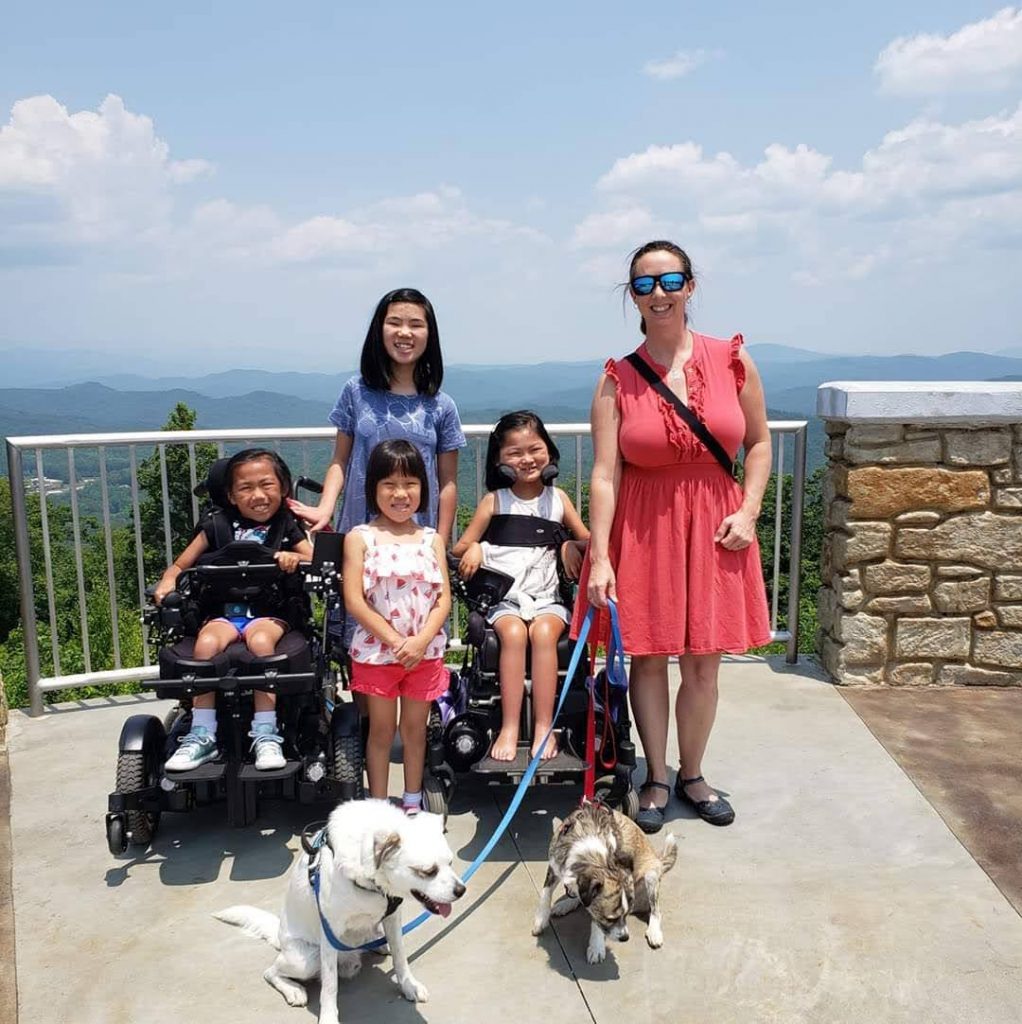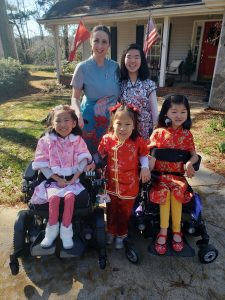Mother Raises 4 Adopted Girls From China With SMA, Chronic Illnesses

When Josylnn Jones McLaughlin moved to Guangzhou, China, to teach conversational English in 2012, she didn’t expect to bring home two girls, one with spinal muscular atrophy (SMA) and the other with spina bifida, when she returned to Anderson, S.C., more than a year later.
She certainly had no plans to ultimately adopt four daughters from China and become an SMA advocate.
Before flying overseas, McLaughlin, 41, had read about the orphan crisis in China. She knew she wanted to be involved somehow, she said in an interview with SMA News Today.
While the one-child policy was in place from 1979 to 2015, many healthy girls were left behind by their families. Now, however, most of the children in the orphan system have special needs due to a lack of medical care, McLaughlin said.
Just three weeks after she arrived in China, McLaughlin visited a country orphanage two hours outside the city. It was a challenge to even find the place with its rural foreign address, let alone secure transportation to get there. But the trek paid off. She met her future daughter, Laila, then 16 months old, when she first stepped foot in the orphanage.
All the other children looked content where they were, McLaughlin said. That wasn’t the case for Laila, who she found out later has SMA type 2.
“She really stood out to me,” McLaughlin said. “She was very mournful. She had a lot of awareness about her surroundings, and about her situation. And she was just so sad.”

For the next couple of months, McLaughlin thought a lot about Laila. She felt like she had to do something. Before long, she got permission to foster Laila in her home in China. It took 22 long months for the Chinese government to make Laila eligible for adoption, she said.
At that time, prospective parents could adopt two children through the same process. That’s how McLaughlin and her husband, from whom she is now separated, were matched with their youngest daughter, Charlet, who is now 9 and has spina bifida.
That first meeting with Laila also started McLaughlin on a path that led her to later adopt another girl from China, now 16-year-old Willow, who has cerebral palsy.
She also added to the family a second daughter with SMA type 2 — Maizey, who now is 12 — and has become an advocate within the SMA community.
McLaughlin didn’t know that Laila had SMA until genetic testing at the Shriners Hospital for Children, in Greenville, S.C., uncovered her true diagnosis. She quickly got involved with the SMA community through conferences, and Laila participated in the first clinical trials for Spinraza (nusinersen) in spring 2015.
Before Laila, Maizey, Charlet, and Willow came into her life, McLaughlin didn’t see herself being a full-time stay-at-home mom. When she first returned to the U.S., she was in a PhD program in community economic development at Clemson University — at that point thinking she could do it all. But caring for her two young girls and teenage son, Steven, now 21, and putting in 70 hours per week at school brought her to a tough decision. She opted to give up her career to do the best she could for her children.
Raising two girls with rare diseases and two more with other disabilities isn’t easy, especially as a part-time small business owner — she’s sold several hundred handmade masks and vinyl decals for power wheelchairs. Her girls rely on her for every physical activity, from feeding them breakfast to personal care to homeschooling. But they are her kids after all, and she wants them to have the best life possible, so she’s happy with the way things worked out for her daughters.
“It’s really amazing to be at home with my girls all day, every day to be a part of their education, to watch them grow and develop, talk through the hard things with them and be there for every minute of every procedure that they’ve ever gone through,” McLaughlin said.
Because McLaughlin felt she had been adopted into the SMA community herself when Laila was diagnosed, when she heard that another family who had adopted a girl with SMA could not continue care for her, she decided to step in.
“We just felt like we were able to offer experience, and it was something that we felt like we could take on and handle and she was in a pretty desperate situation,” she said.
In 2015, two years after she first brought home Charlet and Laila, she added Maizey, then 7, to the growing family.
For a while, McLaughlin settled into the routine of happily caring for her three daughters. But after another couple of years, that drive she first felt to do something to help Laila worked its way into her mind again. After fundraising and working to make enough money to support another child, she sprang into action yet again.
“The life that so many children in China are living, it’s hard to turn your back and not do something if you think you can,” McLaughlin said.
Children in the Chinese orphan system are no longer eligible to be adopted after the age of 14, meaning they are on their own from then on. McLaughlin knew children aging out were the most at-risk group after rare disease and medically fragile children. She had seen one girl, Willow, 13, with cerebral palsy, who had been waiting for years to get adopted. Finally, the stars aligned for them both, McLaughlin said. In May 2017, she brought home her oldest, and newest, adopted daughter.
Bringing the girls to the U.S. allowed them all to be treated with the latest medical therapies. That was a game-changer, especially for Laila and Maizey, who could be given the new medicines developed for SMA. Both initially were on Spinraza and switched over to the oral daily medication Evrysdi (risdiplam), once it was approved in August 2020.
These medications have changed the outlook for any patient with SMA, McLaughlin said.
“What I always tell people is SMA is a deadly life-taking disease, with no other trajectory,” she said. Now, she said, “My girls are strong and healthy and stable and looking toward the future.”
As Rare Disease Day is celebrated on Sunday, Feb. 28, McLaughlin is reminding everyone that whatever situation people find themselves in, they have inherent worth. That’s why she chose to adopt Laila after just moving to Guangzhou nine years ago. It changed her life forever — for the better, she says.
“They’re extremely valuable human beings, they have a life worth living, the efforts that are made on behalf of them are worth it,” McLaughlin said. “And their lives are worth it.”
.pf-button.pf-button-excerpt { display: none; }
The post Mother Raises 4 Adopted Girls From China With SMA, Chronic Illnesses appeared first on SMA News Today.



